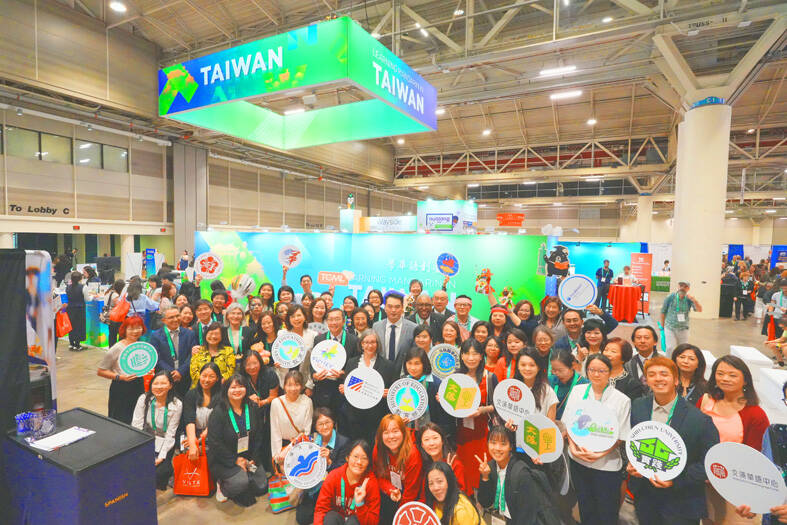A total of 102 universities from Taiwan and the US are collaborating in a push to promote Taiwan as the first-choice place to learn Mandarin, with seven Mandarin learning centers stood up in the US to train and support teachers, the Foundation for International Cooperation in Higher Education of Taiwan (FICHET) said.
At the annual convention of the American Council on the Teaching of Foreign Languages held over the weekend in New Orleans, Louisiana, a Taiwan Pavilion was jointly run by 17 representative teams from the FICHET, the Overseas Community Affairs Council, the Steering Committee for the Test of Proficiency-Huayu, the Foundation for Scholarly Exchange, and several colleges and industrial institutions.
The National Palace Museum and the National Center for Traditional Arts participated in the event for the first time, aiming to combine cultural legacies with language education to showcase the cultural depth and richness of Taiwan, creating more engaging learning experiences for Mandarin students.

Photo courtesy of the Foundation for International Cooperation in Higher Education of Taiwan
FICHET executive director Lin Tzu-pin (林子斌) said that with support from the Taiwan-US Education Initiative and the Executive Yuan’s Mandarin education scheme, the Ministry of Education’s Taiwan HUAYU Best program has helped establish ties between 23 local universities and 79 US universities,
Seven Mandarin learning centers were set up in the US to provide systemic teaching support and Mandarin teacher training, he said.
Under the initiative, the ministry promotes bilateral education exchanges between Taiwan and the US jointly with the American Institute in Taiwan, with an exhibition held during the convention to unveil the outcomes of bilateral cooperation in Mandarin education.
A “Taiwan Night” with performances by Taiwan’s folk-dance troupes at dinner was held, and there was a symposium during the convention for representatives from the government and academia to discuss how to build a more comprehensive global Mandarin-learning ecosystem based on the initiative.
In a related development, the National Central Library (NCL) last week donated Taiwan-published books to start a “Taiwan Corner” at the Hawaii State Library (HSL).
The books range across various fields, including literature, history, arts, nature and social sciences, while the HSL gave 22 books related to Hawaii’s cultures and conventions to the NCL in return.
NCL Director-General Wang Han-ching (王涵青) said the HSL has long been devoted to knowledge popularization in Hawaii and the Taiwan Corner is expected to be a starting point for locals to learn more about Taiwanese cultures.
Hawaii State Public Library System State Librarian Stacey Aldrich said Hawaii and Taiwan are similar in terms of indigenous cultures, and a geography of high mountains and the ocean.
The Taiwan Corner would boost locals’ understanding of Taiwan and enrich the HSL’s Asian book collections, she said.

US climber Alex Honnold is to attempt to scale Taipei 101 without a rope and harness in a live Netflix special on Jan. 24, the streaming platform announced on Wednesday. Accounting for the time difference, the two-hour broadcast of Honnold’s climb, called Skyscraper Live, is to air on Jan. 23 in the US, Netflix said in a statement. Honnold, 40, was the first person ever to free solo climb the 900m El Capitan rock formation in Yosemite National Park — a feat that was recorded and later made into the 2018 documentary film Free Solo. Netflix previewed Skyscraper Live in October, after videos

NUMBERS IMBALANCE: More than 4 million Taiwanese have visited China this year, while only about half a million Chinese have visited here Beijing has yet to respond to Taiwan’s requests for negotiation over matters related to the recovery of cross-strait tourism, the Tourism Administration said yesterday. Taiwan’s tourism authority issued the statement after Chinese-language daily the China Times reported yesterday that the government’s policy of banning group tours to China does not stop Taiwanese from visiting the country. As of October, more than 4.2 million had traveled to China this year, exceeding last year. Beijing estimated the number of Taiwanese tourists in China could reach 4.5 million this year. By contrast, only 500,000 Chinese tourists are expected in Taiwan, the report said. The report

Temperatures are forecast to drop steadily as a continental cold air mass moves across Taiwan, with some areas also likely to see heavy rainfall, the Central Weather Administration (CWA) said. From today through early tomorrow, a cold air mass would keep temperatures low across central and northern Taiwan, and the eastern half of Taiwan proper, with isolated brief showers forecast along Keelung’s north coast, Taipei and New Taipei City’s mountainous areas and eastern Taiwan, it said. Lows of 11°C to 15°C are forecast in central and northern Taiwan, Yilan County, and the outlying Kinmen and Lienchiang (Matsu) counties, and 14°C to 17°C

STEERING FAILURE: The first boat of its class is experiencing teething issues as it readies for acceptance by the navy, according to a recent story about rudder failure The Hai Kun (海鯤), the nation’s first locally built submarine, allegedly suffered a total failure of stern hydraulic systems during the second round of sea acceptance trials on June 26, and sailors were forced to manually operate the X-rudder to turn the submarine and return to port, news Web site Mirror Daily reported yesterday. The report said that tugboats following the Hai Kun assisted the submarine in avoiding collisions with other ships due to the X-rudder malfunctioning. At the time of the report, the submarine had completed its trials and was scheduled to begin diving and surfacing tests in shallow areas. The X-rudder,